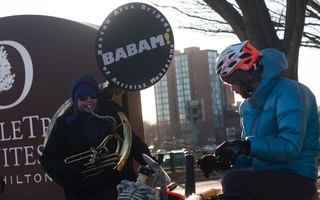Roper said that his band though a band's energy is most important. "Ours is definitely an energetic performance. Our stage prescience is much more important to us than being musically tight--we like to do wild stuff."
Retella said. "It's a bit ironic that sometimes the most technically talented people get the worst audience response, because people respond a lot to energy."
Schwartz said he does think that playing for other people is important, saying, "Music is like a language, it's a form of communication--you have to share it." He compared a musician that plays only for himself to a painter that keeps all of his artwork locked up.
Peasley added, "Music is self-expression, but it's also communication, and that requires that someone else is listening."
Ample Opportunities
Many Harvard musicians say they have ample opportunities to perform. Axelrod said that his band had played at a number of House parties, as well as at Jack's a local nightclub.
Cookin, the Cabot House nightclub, also showcases talent. "It's great, especially because it offers opportunities for bands that aren't dance bands," Peasley said.
Schultz said that "it's kind of a bassle that they don't pay, but Cookin' is good for publicity."
While there my be chances for band to perform, finding a place o practice can be extremely difficult. "Harvard's done what they can to squash the rock and roll scene," said James A Latham '84-85, guitarist for Commissioner Gordon, adding. "There's no decent place on campus for rock bands to practice."
Musicians said that bands used to be able to play in the Freshman Union, but that it was no longer allowing bands to store equipment there, and had restricted the hours during which bands were allowed to practice o a total of nine hours a week, no more than two at a time.
Joshua A. Berber '88, co-chairman of the Undergraduate Council's social committee, said that social committee might consider helping to find a solution to this practice problem.
"The University doesn't give bands a lot of encouragement. They will help classical musicians out a lot more than rock or jazz," Peasley said.
Latham, who is concentrating in music, said. "They don't care what's happened since 1810 in the Music Department."
Peasley said the University's lack of rehearsal space had resulted in a low number of bands on campus. He also cited academic pressures as a reason for low participation: "There are a great number of talented musicians, but many of them are willing to let their music slide, because of their academics."
Schultz said hat many of Harvard's best musicians are no tin bands. He added, "We're here for the academics, and when the two start to conflict, the academics are going to win."
Read more in News
The Quest for a Fuller ExistenceRecommended Articles
-
Rhythm Method to Go To Battle of Bands FinalRhythm Method, Harvard's newest music sensation, last week rocked its way to a berth in the finals of an East
-
Funeral Music Plays For Bastion of the BluesTwo weeks ago, music-obsessed students lost a cultural landmark. But it wasn’t one of the historic sites on campus—it was
-
Musician Brings Veritas to EarsIn the mix of magicians, calculus-focused raps, and boy-band stars performing at the Freshman Talent Show in September 2001, Daniel
-
Long Live Rock: Students To Revive Battle of BandsAccording to drummer Shirley L. Hufstedler ’07, when student musicians from other colleges come to play at Harvard, they are
-
 Musicians of the World, Unite!
Musicians of the World, Unite!













